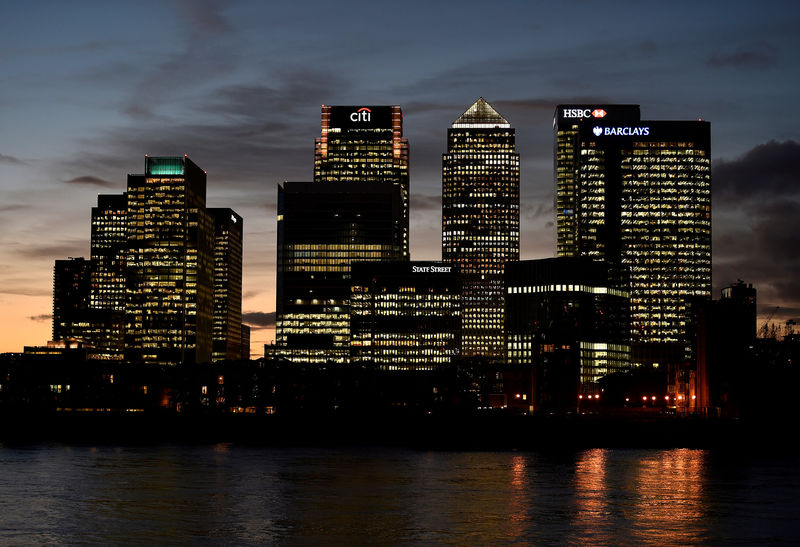By Huw Jones
LONDON (Reuters) - Britain's financial sector is drawing up proposals on how it could still serve EU clients after Brexit, even as firms begin establishing new operations on the continent to keep access to the European market.
Regulatory and banking experts working for the City of London and lobby group TheCityUK are basing their ideas on a 'mutual recognition' system. Under this, the European Union and Britain would broadly accept firms in each other's financial markets because their home regulatory systems apply similar standards.
Such a system might limit what is likely to be a flow of business and jobs from the London financial centre, by far Europe's biggest, to countries that remain in the EU.
However, sceptics say mutual recognition is largely untested globally and would struggle to win approval within the EU, where there are already calls to make it harder for British financial firms to operate in the bloc, not easier, after Brexit.
Undaunted, the experts on the International Regulatory Strategy Group (IRSG) will set out their proposals in a forthcoming paper. This aims to provide ideas for British negotiators after Prime Minister Theresa May formally notified Brussels on Wednesday of her country's intention to seek a divorce from the remaining 27 EU member states.
"You are saying the outcomes from the UK and EU27 regulatory systems are broadly comparable and this is the way to go forward," IRSG Chairman Mark Hoban told Reuters.
Some British financial firms - and foreign banks using London as a European base - are already working on plans to move jobs to centres such as Frankfurt, Dublin, Paris and Luxembourg for after Britain loses its blanket "passporting" rights to sell financial services in the EU single market.
Germany, however, says they will not be offered any special exemption from regulations.
GRAPHIC - Banks' Brexit dilemma http://tmsnrt.rs/2mQI774
GRAPHIC - Britain's banking economy http://tmsnrt.rs/2nrufUG
A BETTER BASIS
Firms from outside the EU are already allowed some access to the single market under an 'equivalence' system, provided the European Commission deems their home rules and supervision to be equivalent in strictness. Britain could therefore technically qualify as a "third country" under this system after Brexit.
In practise the system is cumbersome. It operates firm-by-firm, does not cover all activities, has no fixed timetable for approvals and authorisations can be cancelled at short notice, bankers say. It took four years for the EU to deem just one set of U.S. derivatives clearing rules to be equivalent as talks got bogged down over technical details.
"It's very clear that the third country model doesn't work for the UK. There has to be a new basis on which trade is done cross-border between the UK and EU27," said Hoban. "The focus on mutual recognition of regulatory outcomes is a much better basis for continuing to trade cross-border."
The hope is that a mutual recognition deal with the EU would be much more comprehensive, encompassing large numbers of firms and business areas rather than the current piecemeal approach.
May told parliament on Wednesday she wanted a "bold and ambitious" trade deal covering economic affairs with the bloc within the two-year period of negotiations.
PILOT
Hoban said mutual recognition would avoid Britain becoming a "rule taker", as equivalence in practise means cutting and pasting EU rules into domestic law without any say in their framing, as Switzerland has to do.
It would also be flexible enough to cope with two evolving regulatory systems over time, said Hoban, a former junior finance minister.
Past attempts at mutual recognition have achieved little. In 2008 the U.S. Securities and Exchange Commission struck a pilot deal with its Australian counterpart ASIC, but this expired after five years and has not been renewed.
The EU opened talks on a similar Mutual Recognition Agreement (MRA) with the United States but these fizzled out without a deal after the global financial crisis.
"We started exploring the legal complexities, which were considerable," said David Wright, a senior European Commission official at the time. "Many of the problems back then would be faced by a UK-EU MRA as well."
Regulators and lawmakers in the EU say the focus should be on toughening up the equivalence system as this will need to cater for London, which will lie on its doorstep but outside its control, in contrast to smaller centres further afield.
"For the EU27, the key question will be how to deal with relevant risks from what will have to be thought of as a very large offshore financial centre," said Jakob von Weizsaecker, a German Social Democrat.
"Controlling those risks will require a more robust third country equivalence regime," said von Weizsaecker, a member of the European Parliament which will have a veto on any new trade deal with Britain.
Gerard Rameix, who chairs French markets regulator AMF, wants a more demanding equivalence system with Britain, given potentially huge volumes of financial transactions. "Thus the third country regime must be carefully re-assessed within the Brexit context," Rameix said.
Hoban said there was an appetite in the EU to talk about financial services trading models like mutual recognition.
European Commission President Jean-Claude Juncker has promised the Brexit negotiations will be conducted fairly, without seeking punishment of Britain for leaving.
Dan Waters, managing director of ICI Global, a funds industry body, was optimistic Britain could get a special deal with the EU. But he said: "The worry is that the review of third country arrangements could be a smokescreen for introducing a more demanding third country regime to punish the UK."
Kay Swinburne, a British Conservative member of the European Parliament, said that while there was no appetite in the EU for the terminology of mutual recognition in financial services, there was an interest in how to find a platform that encourages future regulatory convergence.

"There is a need for a formal regulatory forum with possibly an arbitration service alongside," Swinburne said.
(editing by David Stamp)